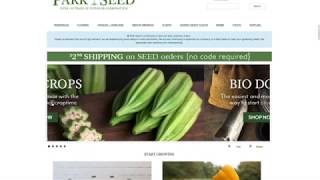How to choose garden seeds online for beginners: Park Seed tutorial
How to choose garden seeds online for beginners: Park Seed tutorial

Update July 1, 2021 – Creatively Balancing Medicine is now Homespun Luxury. At Homespun Luxury, we create confident crafters! We want you to make something beautiful that makes you proud!
To get updates and learn more on my latest posts and videos, go to https://lp.homespunluxury.com/subscribe to sign-up for my Weekly Hello newsletter.
Beginner-friendly websites/companies and non-GMO with lots of information on growing.
Park Seed: https://parkseed.com
Gurney’s Seed & Nursery: https://www.gurneys.com
Burpee: https://www.burpee.com
Territorial Seed Company: https://territorialseed.com
Ferry-Morse Home Gardening: https://ferrymorse.com
Find your zone at https://planthardiness.ars.usda.gov/PHZMWeb.
Weather apps on mobile: https://launchberg.com/best-weather-apps/
Some fast crops (1-2 months): Lettuce, carrots, radishes, okra, beets, kale, mustards, turnips. You can grow sprouts in a week.
What to look for when buying seeds online:
Days to maturity – based on the transplant or direct seeding, depending on the preferred method of growing.
Seeds per packet – if thinning plants as they grow, you will need to have more seeds than you think you need, usually two times. If you are preserving, you’ll also need more seeds. If you are succession planting, you’ll need more seed, since you’ll be planting weekly.
Cool vs. Warm weather vegetable. Look at ideal planting season, i.e. spring, summer, fall.
Description or “About” section – usually lots of information there! The description may also tell you about flavor, color, and texture of the plant.
Resistance: To heat, cold and to pests.
Watch week-by-week gardening on the High-Performance Garden Show for free. Sign-up at https://thelivingfarm.org/high-performance-garden-show/.
Remember, don’t over-buy seeds, until you know if you like the taste or know if it grows well and resistant to the bugs in your area. One variety may work better for you than another!
Some tips on lettuce and other fast-growing crops:
1. This is usually seeded directly in the garden.
2. Try succession planting for continuous harvest, rather than one abundant crop.
3. Check to see if you can eat leaves and roots (for root vegetables).
4. Think about preserving your food, if you grow too much at once. The easiest methods to learn is dehydrating and pickling. Freezing has some processing rules based on the vegetable, but can be easy, too.
5. Remember you may have to thin the plants as they grow out. You can eat your thinnings as “baby” versions of the plant!
6. Taste the produce to determine if ready to harvest. Keep notes, so you know when you like to harvest your vegetables. Based on your taste!
Some terms to know:
Pelleted seeds – covering so easier to plant small seeds.
Companion plants – plants that help each other, either by supporting nutrients or fighting disease or pests.
GMO – genetically modified organism. Scientists take genetic material from one organism into another, even across species.
Hybrid – pollination from one type of plant with another. Usually listed with a letter-number, like F1. Most people don’t save seeds from hybrids as the seeds may not be the same as the hybrid plant (may get different plant-based on mother or father plant).
Resistance – Some plants are resistant to some pests, but you need to know what pests are in your area, to know what plants to choose. A garden journal will help you keep track. Some plants also heat resistant or heat-tolerant (won’t bolt suddenly with high temperatures) or cold-tolerant or cold-hardy (will live through very cold environments).
Direct seed – Some plants, like root veggies, should be planted directly in the soil, not grown from seed and transplanted in the garden.
Transplants – Transplants give plants a head start. Some plants do better as transplants. Transplants are easier to grow than seeds for beginners, but with the pandemic, many people are trying to grow from seed, as they try to social distance or because some stores/nurseries may be closed.
Seed tapes – Space seeds out for you. Saves work, but all seeds may not germinate, so they may have gaps when you grow it. Also, if you get seed tapes with different seeds, you don’t get to choose your seeds.
Biodomes are an easy way to grow plants from seeds to make transplants for your garden: https://parkseed.com/park-bio-dome-seed-starter/c/bio-dome/
To get notifications of future workshops and live events, check out my Facebook page at https://fb.me/homespunluxury.
Please visit my website at https://homespunluxury.com for full transcripts/summaries and more information.
This video is for informational and educational purposes only. This is my opinion only. Check out my full disclaimer at https://www.homespunluxury.com/disclaimer.
No affiliate links. Meaning clicking on a link does not give me a commission. This is my opinion only.









